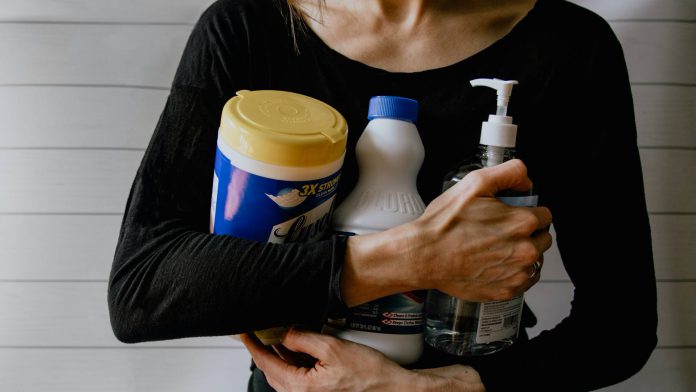These past few weeks have been challenging for all — with the threat of COVID-19, coping with quarantine or self-isolation, and trying to maintain a normal life in the midst of it all. One thing that the past few weeks have taught us is the importance of maintaining cleanliness and even proper sterilizing or disinfecting practices. Most of us might already be OC about keeping our homes spic and span, but how many of us are going the extra mile of deep-cleaning or sterilizing our homes?
To help you out (and add on to your OC-cleaning routine), we’ve listed a few common “high-touch” items that we need to keep properly sanitized. Doing so can prevent the spread of viruses and help in keeping ourselves and loved ones healthy.
Doorknobs
Our day is incomplete if we don’t touch a doorknob even once — and the same goes for your entire household or workplace, so obviously, doorknobs are packed with germs and bacteria. One swab can fill a petri dish with bacteria — that’s a lot!
What you’ll need: 70% isopropyl alcohol
Do this: Spray alcohol on your doorknob and let it sit/dry. Alcohol is more effective than vinegar as vinegar does not affect viruses.
Mobile phone
Most of us are glued on our mobile phones whether we’re stuck at home, at work, or anywhere. So yes, our phones are dirty, and in fact, it’s considered dirtier than a toilet seat — eeww. So if you’re still not regularly disinfecting your phone, now is the best time to start.
What you’ll need: 70% isopropyl alcohol, wipes or microfiber cloth, cotton swab
Do this: Power off your phone and spray alcohol into the microfiber cloth, or use disinfecting wipes to wipe your entire phone clean. You can also spray alcohol into cotton swabs and use it to dab over the earpiece, ports, and speakers to clean these as well. Try to maintain your phone relatively clean by washing your hands regularly.
Clothes
While we do know that clothes tend to get dirty (hello, unrelenting laundry duties), do you know that clothes can also transmit viruses and bacteria? An average person has about one-tenth gram of fecal matter in his/her underwear — gross, right? And some viruses can pass via the fecal-oral route. Hence, it’s also a good idea to disinfect your clothes when laundering.
What you’ll need: chlorine bleach, water
Do this: Add ¾ cup of chlorine bleach to your bleach-safe laundry. For colored clothing pieces, use oxygen bleach or color-safe bleach.
Laptop
If you think that your mobile phone is dirty, wait for it, your laptop might be worse. According to research, laptops are filthy and can have 400 times more bacteria than the average toilet seat, more so if it’s a shared resource. Makes you want to start cleaning right now? Here’s how:
What you’ll need: disinfectant wipes, lint-free cloth, dishwashing liquid, compressed air (if possible)
Do this: To start, turn off your laptop. Mix a bit of dishwashing liquid and water in a bowl. Take your lint-free cloth and dip it into the mixture. Wipe your laptop’s lid and bottom panel. Rinse with clean water and wipe again. Get a dry cloth and wipe your laptop down to avoid water streaks. Ideally, you need compressed air to clean crumbs and other grime stuck in the keys in your keyboard. After, take a disinfectant wipe and dab over the keys.
Cords
If you want your cords and chargers looking white, new, and virus-free again instead of gray, grimy, and virus-laden, then start wiping.
What you’ll need: cotton buds, rubbing alcohol
Do this: Grab a few cotton buds, soak in rubbing alcohol, and wipe down your cords.
Cash
Cash — whether it’s bills or coins are filthy. Most of these stay in circulation for 5 to 15 years and as such, have passed through thousands or even millions of people before landing in your wallet. A study has found that money can harbor hundreds of species of microorganisms. Among those found are several harmless types of bacteria, acne-causing bacteria, and even vaginal bacteria, mouth microbes, and DNA from pets and viruses. Aside from bacteria and viruses, bills and coins can also contain harmful pathogens such as E. coli, salmonella, and the serious illness-causing staphylococcus aureus.
And while these microbes cannot necessarily make you sick, it’s better to be safe than sorry right? Besides, even if these microbes may prove harmless to your hands, your hands can then transmit them to another less-protected part of your body. So it’s best to always wash your hands. But if you also want to play it safe, especially in this time of COVID-19, here’s an easy way to disinfect your cash.
What you’ll need: rubbing alcohol, cloth or UV light or iron
Do this: Dampen your cloth with rubbing alcohol, then use it to wipe down your bills and coins on both sides. Ensure that you let your bills dry after. Alternatively, you can also place your bills in between pieces of fabric or cloth and run a clothes iron over it. Or if you have a UV sterilizer, you can also use it to run over your bills to destroy germs and other microbes.
Bottom line: Whether you’re staying home or going back to your daily routine (work after the quarantine), it’s best to err on the side of caution and always always wash your hands. Having and using a UV sterilizer can also help in minimizing the risk of infection. We love UV Care’s handheld UV Care Deluxe Germ Terminator and UV Care Pocket Sterilizer. As handheld sterilizers, both are easy to use for your everyday items such as mobile phones, cash, laptops, tablets, eyeglasses, and even your kid’s toys. So better start cleaning and disinfecting, mamas.
Join our MomCenter Community on our Facebook page and Facebook group for more insights on motherhood and parenting.





